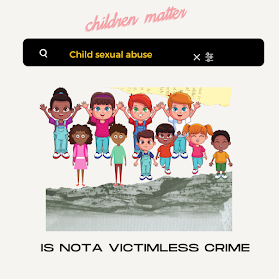I think most adults have at least the first step of the "grooming process" well understood. To review: Grooming begins by bui...
I think most adults have at least the first step of the "grooming process" well understood.
To review:
Grooming begins by building rapport and gaining the trust of another person or group.
The targeted person or group often believes that the intentions of the groomer are pure and genuine.
They see no need to be concerned at all. There are many attempts to change the meaning and understanding of "grooming" as it relates to child abuse.
Not surprising.
Confusion and chaos are common tactics in any manipulation, especially violence, and abuse.
Predator vs. Prey
Nature is the best teacher when it comes to understanding grooming.
Watch this short video (1:53) of a stoat using flash and distraction to lure in a rabbit. If you want to avoid seeing the actual catch, you can stop at the (1:45) mark.
"Known" v "Familiar"
Most people who are violated or abused are attacked by someone familiar with them.
While many people still use the term "known" in place of the word "familiar", please try to remember to avoid that.
FACT: Most individuals who experience violation or abuse are targeted by someone who is familiar with them.
It's important to use the word "acquainted" or "familiar" instead of "known" as the latter can be misleading and potentially lead to more victims being overlooked.
Using "known" also implies a level of intimacy that may not exist and can complicate understanding of the situation.
This is especially important to note when discussing child abuse as many may assume that the perpetrator is a family member.
We do not want to overlook cases where the abuser could be a teacher, coach, religious leader, school activity sponsor/leader/volunteer, older child, or even a neighbor.
It's crucial to recognize and address all forms of abuse, regardless of the perpetrator's relationship to the victim.
"Familiar" is a more accurate term.
Especially when you think of children who were groomed and assaulted by someone like an adult neighbor, for instance, that they see around but do not have reason to socialize with (of course).
Most children are not 'friends' with adults.
Other examples of casual acquaintance have included:
- adult friends of their parents
- adult/older youth relatives of their childhood friends
- treating, healing, or coaching professionals
A Little Background.....
As researchers delved into the patterns of sexual violence, specifically among teenagers and young adults, they found that assaults were occurring between people in more casual relationships.
Once upon a time, it was quite common for members of the public to believe that women and children were most likely to be assaulted by a stranger wearing a ski mask. In the mind of the public, assaults primarily took place at night and rarely inside the home.
Though we still have a long way to go in our understanding of sexual violence, public service education, and awareness have helped people to get a better understanding.
This goes against the common belief that assaults only happen to women and children by strangers in a specific scenario.
Parents' Duty to Child Safety and Protection
Parents are right to be watchful about any connections that their children are making with adults and older children, especially that the parents do not know.
It is completely understandable for parents to want to keep an eye on the interactions that their children have with adults and older children whom they may not know. It is natural for them to want to always ensure their children's safety and well-being.
Therefore, any attempts by governments, schools, organizations, or individuals to prevent parents from accessing information about what their children are being taught about sex or adults they encounter should be a cause for concern. This is because parents have a right to know what their children are exposed to and have a say in how they are raised.
These days, it can be extremely hard to find support these days, but parents should seek the support of other trustworthy parents. Parents may even consider seeking advice from legal counsel.
“If you normalise underage sex to children, it's grooming and exposing them to sexual abuse. It's a mission to sexualise children and people don't understand there's a huge safeguarding risk in that. It is child indoctrination.” https://t.co/g7u2xxxF1m
— Women's Rights Network - WRN (@WomensRightsNet) June 18, 2023


.png)











.png)



